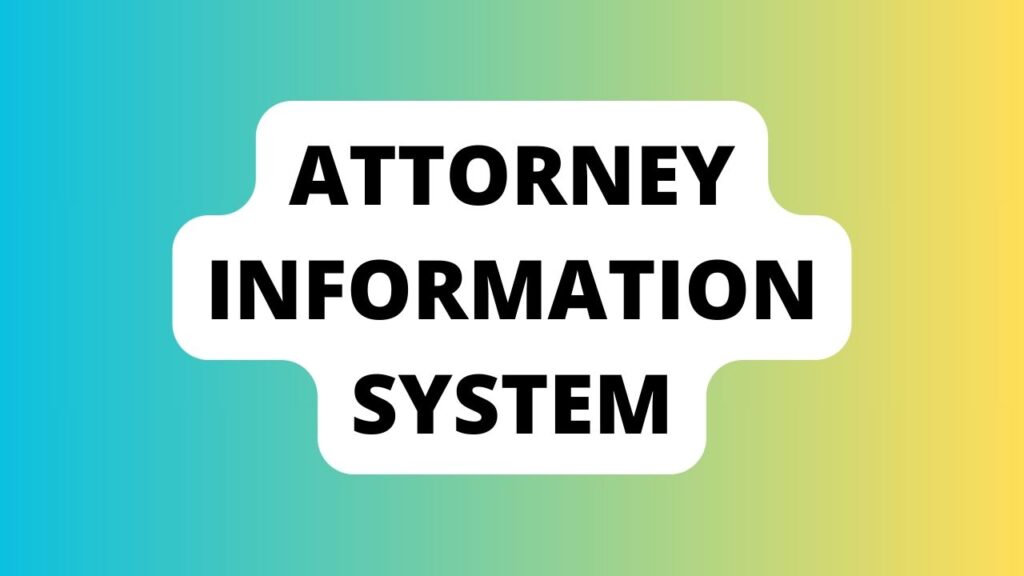Introduction
Welcome to the future of legal practice, where efficiency meets expertise through the Attorney Information System. In this detailed guide, we delve into the transformative power of this system, showcasing how it streamlines operations, enhances decision-making, and elevates the standards of legal services.
Understanding the Attorney Information System
The Attorney Information System redefines how legal professionals operate. It’s a multifaceted platform that integrates various tools and databases, empowering lawyers with a wealth of resources at their fingertips. From case management to legal research, document drafting to client communication, this system encompasses it all.
Evolution of Legal Tech: A Brief History
Legal technology has significantly evolved, and the Attorney Information System stands as a pinnacle of this evolution. From early database systems to cloud-based solutions, the journey has been about making legal processes seamless and information readily accessible.
Features of Attorney Information System
The Attorney Information System boasts a range of features designed to augment legal workflows:
- Case Management: Efficiently track and manage cases, deadlines, and client interactions.
- Legal Research: Access an extensive database for comprehensive legal research, precedents, and rulings.
- Document Drafting: Streamline document creation with templates and AI-powered drafting tools.
- Client Communication: Facilitate seamless communication and updates between lawyers and clients.
Role in Modern Legal Practice
In today’s legal landscape, staying competitive means embracing technological advancements. The Attorney Information System isn’t just a convenience; it’s a necessity. Its role extends beyond simplifying tasks; it transforms the way legal professionals approach their work, fostering precision and informed decision-making.

Understanding Attorney Information Systems
Evolution of Legal Tech Solutions
Applications in Legal Practices
Integrating AI in Legal Databases
Attorney Information Systems have evolved significantly, mirroring the technological advancements shaping the legal landscape. From basic database management to intricate AI integrations, these systems have undergone a transformative journey. Such evolution enables legal professionals to harness streamlined processes, facilitating efficient case management and data handling.
Benefits of Implementing AIS
Enhanced Case Management
Improved Data Security Measures
Time and Cost Efficiency in Legal Procedures
Implementing an Attorney Information System yields an array of benefits. By optimizing case management, these systems offer a centralized platform for organizing case-related information, boosting productivity, and fostering collaboration among legal teams. Furthermore, robust security measures ensure the confidentiality and integrity of sensitive legal data, assuring clients of utmost privacy. Notably, the time and cost efficiencies realized through AIS implementation are pivotal, allowing firms to allocate resources more effectively.
Implementing AIS: Best Practices
Customization for Firm Needs
Training and Adoption Strategies
Ensuring Compliance and Ethical Standards
When integrating an Attorney Information System, tailoring the system to the firm’s specific requirements is crucial. Adequate training and adoption strategies are imperative to maximize the system’s potential. Moreover, ensuring compliance with legal and ethical standards is non-negotiable, guaranteeing that data management adheres to industry regulations and professional ethics.
AI’s Role in the Future of Legal Practice
Predictive Analytics in Case Outcomes
Enhancing Client Interactions with AI
Ethical Implications and Challenges
The future landscape of legal practice intertwines closely with AI advancements. Predictive analytics leveraging AI can potentially forecast case outcomes, aiding attorneys in devising strategic approaches. Moreover, AI-powered tools can enhance client interactions, offering personalized services and efficient communication channels. However, ethical implications and challenges concerning AI’s role in decision-making and data privacy require careful consideration and regulatory frameworks.
Attorney Information System: Addressing FAQs
Q: What distinguishes an Attorney Information System from traditional database systems? Q: How does AI integration benefit legal professionals within AIS? Q: Can AIS handle the diverse needs of different legal practice areas? Q: Is training essential for successfully adopting an Attorney Information System? Q: What security measures are typically employed within AIS? Q: Are there any ethical concerns associated with AI implementation in legal practices?
Conclusion
The Attorney Information System stands as a pivotal innovation in legal tech, revolutionizing how legal professionals manage data, streamline operations, and navigate the intricate landscape of legal practice. By embracing this technology, law firms can not only enhance their efficiency and productivity but also ensure a higher level of service and data security. As the legal realm continues to evolve, AIS remains a cornerstone for firms aspiring to excel in a rapidly changing landscape.
